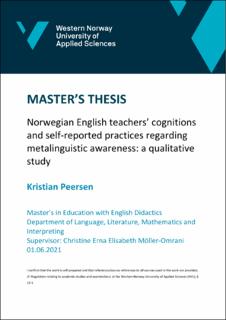Norwegian English teachers’ cognitions and self-reported practices regarding metalinguistic awareness: a qualitative study
Master thesis
Permanent lenke
https://hdl.handle.net/11250/2770438Utgivelsesdato
2021Metadata
Vis full innførselSamlinger
Sammendrag
Metalinguistic awareness can be beneficial for cognitive processes and second language acquisition. How grade five to seven teachers in the Norwegian EFL classroom promote metalinguistic awareness to their pupils can be based on several factors, such as the Norwegian English subject curriculum (ENG01-04), their cognitions, and their self-reported practices. By analysing the ENG01-04 and NOR01-06 and interviewing teachers (n=4) an inquiry was made into how these factors are relevant when it comes to promoting metalinguistic awareness to the grade five to seven pupils. The findings were analysed thematically and revealed that the curriculum promotes metalinguistic awareness through sections of its general part and relevant competence aims. The teachers’ cognitions about metalinguistic awareness can be related to a communicative language approach, while their self-reported practices are similar to their cognitions, except when attending to features related to cross-linguistic metalinguistic awareness. The study found that teachers want their pupils to produce what they perceive as “good language”, but their cognitions and selfreported practices can differ slightly about how.
Beskrivelse
Master’s in Education with English Didactics
Department of Language, Literature, Mathematics and
Interpreting

